Google has launched an online safety course in Arabic to help teachers pass on the message of web security to children.
The short online course designed for parents and teachers will help them learn how to create a positive online experience for students, and encourage safe online behaviour as children grow up.
The move comes amid increasing warnings at the financial and physical threat that young people are being exposed to.
A recent survey published by online security experts Norton found younger people were more likely to be exposed to cybercrime, with one in five millennials admitting to not having protective measures in place for at least one device.
The digital citizenship course, which is found on the Google for Education website, has been launched to mark Safer Internet Day on February 6.
Google has also published Arabic video tutorials on YouTube, offering children online safety tips like how to protect their devices, how to strengthen their sign-ins and avoid scams.
“As people do more online every day, they need to be able to connect and explore the web with confidence and trust to get the most out of it,” said Joyce Baz, head of communications at Google in the Middle East and North Africa.
“We want to build a safer web for everyone so that it remains a positive, safe place that inspires everyone to do and discover more.
“We take online safety and the safety of the internet seriously with our products, tools, shared resources, as well as industry partnerships.”
____________
Read more:
Close to Dh4 billion lost last year to UAE cybercrime
Almost 800 cybercrime cases handled by Abu Dhabi Police last year
____________
According to a 2017 YouGov poll that surveyed 1,000 people aged 18-30 in the UAE, 56 per cent of respondents said their parents or school teachers never spoke to them about the importance of strong passwords and online safety.
A further 68 per cent of respondents said they were worried about their online accounts being hacked and just 1 in 4 said they use different passwords for their online services.
Teachers taking the Google security course will learn how to integrate online safety learning and activities into their classroom curriculum.
It will focus on four key areas; safety on the go and the importance of strong passwords, safe browsing and how to spot fake news, safety from phishing scams and how to manage your online reputation.
By learning internet security tips at school, children will be able to reduce their risk of becoming vulnerable to online financial crimes and debt as they grow up to become young adults.
Online security experts at Norton reported criminals raided almost Dh4 billion from UAE victims due to poor internet security in 2017.
More than one in 10 UAE consumers (13 per cent) experienced ransomware in 2017.
For those who fell victim it has been costly, with one in five (18 per cent) paying a ransom but getting nothing in return.
“Despite a steady stream of cybercrime sprees reported in the media, too many people appear to feel invincible and skip taking even basic precautions to protect themselves,” said Tamim Taufiq, head of Norton Middle East, speaking after the release of the report last month.
“This disconnect highlights the need for consumer digital safety and the urgency for consumers to get back to basics when it comes to doing their part to prevent cybercrime.”
Poor internet security and increasing cybercrime is putting online shoppers at greater risk of financial stress, psychologists have said.
Debt and financial problems are two of the main causes of depression in the UAE, with cybercrime only worsening the pain for some.
“The relationship between debt and psychological distress is complex and it can be both a cause and symptom of mental ill health,” said Tanya Dharamshi, a counselling psychologist at The Priory Wellbeing Centre in Dubai’s Healthcare City, where counsellors are seeing an increasing number of patients suffering from debt related stress.
“Debt can arise from ‘impulse control’ problems that can result in excessive behaviours, such as shopping, especially when it’s online.
“It is human nature to try to associate with a group of society to feel connected and included.
“People often display their social standing and prestige through displays of material dress and lifestyle, irrespective of the result of debt, which is now far easier to accommodate with credit cards and loans.
“It can easily overwhelm, leaving people stressed out about money - stress that puts them at higher risk of lower-quality mental and physical health.”
A study by The Priory Group found that many young adults in particular were suffering significantly from aches and pains caused by debt, with nearly one in three adults aged 25-34 experiencing regular headaches.
Other common symptoms of stress are exhaustion, anger and fear, depression or anxiety and insomnia.
In a 2017 MetLife UK survey, 34 per cent of employees said they were distracted while at work because of financial worries, and almost a third admitted to having time off to deal with money problems.
“In our consumer-driven society, we might regard an addiction to shopping as a manifestation of mental illness,” Ms Dharamshi said.


